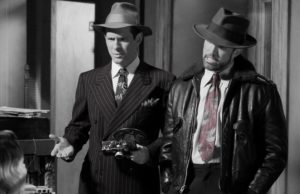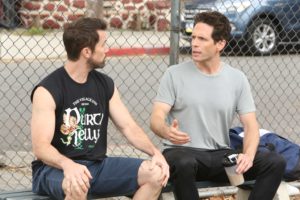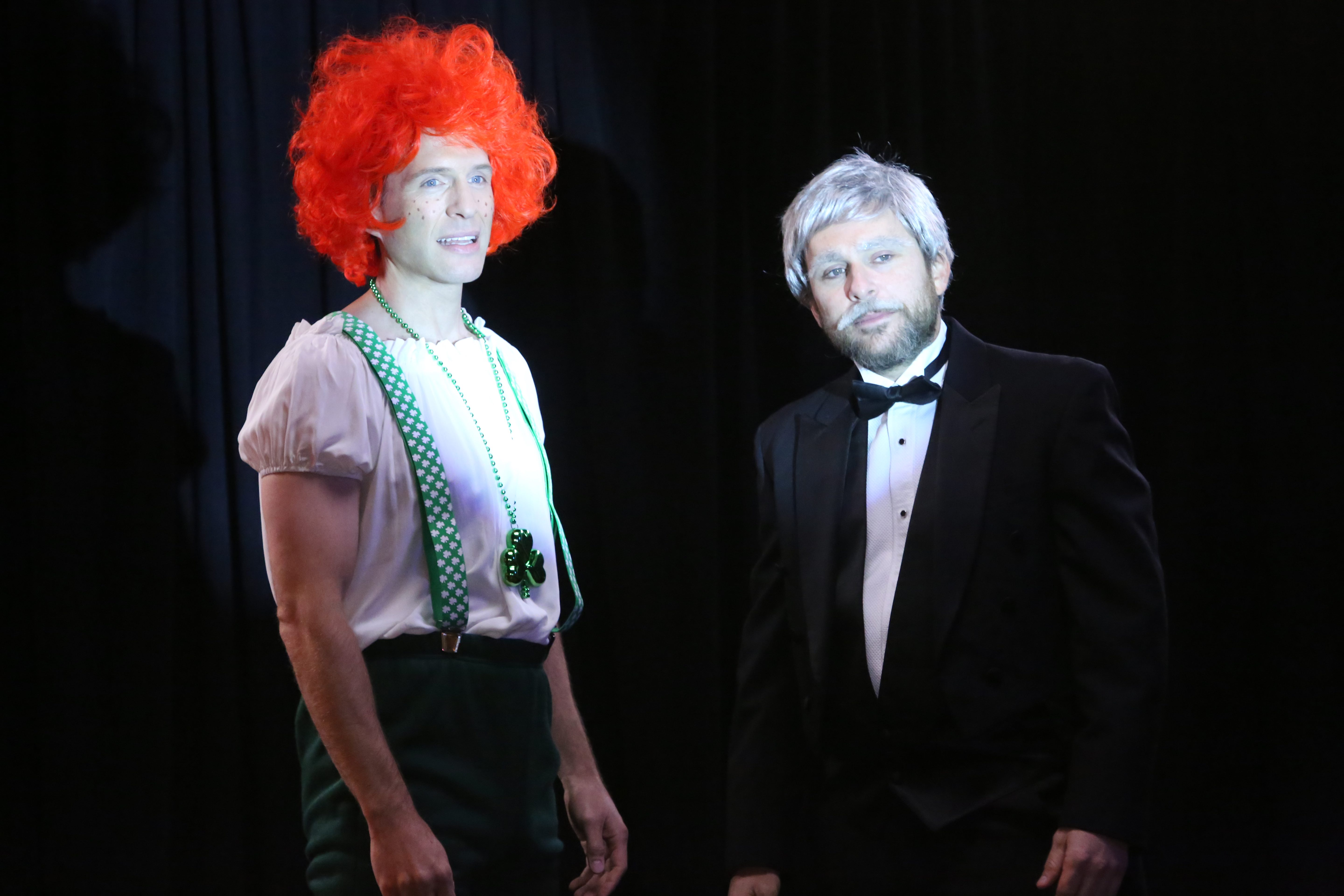Glenn Howerton can’t help but laugh when he thinks about the humble beginnings of It’s Always Sunny in Philadelphia, which ends its fourteenth season this week in a year that ties the series with The Adventures of Ozzie and Harriet (1952-1966) as the longest running live-action comedy in American television history. The feat is almost unthinkable to Howerton (a.k.a. Dennis), thinking about the way he and show creator Rob McElhenney (Mac) shot the pilot with a $200 budget and pitched it to FX without fully knowing what it took to run a television show.
Though It’s Always Sunny would be on most people’s list of best comedies of the twenty-first century, Howerton says the boundary-pushing sitcom has never gotten the accolades to match its warm critical reception. The show’s never won an Emmy and the cast has never been on the cover of Rolling Stone.
“It’s almost like we’re the Phish of shows,” Howerton laughs over the phone. “It’s like we were never celebrated but we always had street cred.” Street cred puts It’s Always Sunny’s accomplishments lightly, especially given the comedy’s vast catalogue and replay value. We caught up with Howerton to discuss wrapping up the sitcom’s record-tying fourteenth season, what’s changed over the last decade and a half, and how much longer fans can expect to see the Paddy’s Pub crew together onscreen.
Does it feel different wrapping this season than it did back in 2005?
Yeah, it was much more of a grind back then, because we didn’t have the staff that we have now. That’s not to say the crew we had then wasn’t good; they were great. It was less and it was new. We were kind of figuring it all out as we went, so there were a lot more calories being burnt daily figuring out how to make this show and figuring out what this show was. We were also producing more episodes back then. It would take us a full nine to ten months from the time we’d first sit in the room and talk about what kind of stories we wanted to tell that year until the time when we were completely finished with the final sound mix of the last episode.
Do you have the same love for the episodes you’re making now vs. then? Those old episodes are classics, but you have more resources at this point.
“I’m not sure how many shows do this, but we cross cover every scene. We shoot all the actors at once, so we can improvise and adlib and fuck with each other in real time.”
I view it the way a lot of people who have small businesses probably view those years. I view those years with a tremendous amount of fondness, as difficult as they were. We were given an opportunity to voice our point of view for the first time. I never had ambitions to be a producer or the boss or a writer, where I’d say Rob always did. In those early years, I was discovering I did have a point of view and I did have strong opinions about what was funny and what wasn’t. I did have strong opinions about how comedy should be acted and I wasn’t always pleased with what I was seeing on television, in terms of how comedy was being executed. We were getting paid shit and it didn’t matter to me, because it was the opportunity. It was long, long fucking days just grinding away. Those first few seasons it was really just me, Rob, and Charlie [Day] doing it and we were figuring it out together. It was a beautiful thing.
Yeah, the early seasons have a kind of punk, DIY mentality behind them. What part of that shines through when you’re filming now?
I’m sure there are other shows that shoot the way our show shoots, but we’ve always had a pretty unique style. It’s very loose and run-and-gun. We’re almost always running three cameras at once. I’m not sure how many shows do this, not to get too technical, but we cross cover every scene. We shoot all the actors at once, so we can improvise and adlib and fuck with each other in real time and make sure that all of it is being captured on camera at once. If I decide to improvise something and you’re only shooting my side, that person’s reaction to whatever I improvised is not going to be on camera. I always had a firm belief from the very beginning that I wanted to shoot the actors all at once, because when actors are acting together there’s a certain energy that happens. If all the actors know they’re all on camera, there’s just a different energy to your performance when you’re on camera vs. with somebody who’s off camera.
Does that come from your theater background?
Yeah, we do all come from theater backgrounds. So much of what we were doing right from the beginning and what we wanted to accomplish with the show and what I felt like I wasn’t seeing on TV, was I wanted everything to feel like it was all happening for the first time on camera. Too many things always felt very clean and crisp and colorful and rehearsed. The comedy beats were so crisp and the jokes were so apparent. I wanted the acting to feel like it wasn’t rehearsed and it wasn’t memorized, although it is very much a scripted show, we adlib a lot and we fuck with each other a lot on camera to get real reactions.
I always had a theory that there has to be a “Harlem Globetrotters” feel to it, that we’re all walking on a tightrope and just having a fucking blast doing it. So, even when my character’s yelling and angry, we as the actors are having fun. It’s always my firm belief that if we’re having fun on camera and on stage, then the audience can actually feel that. That sort of philosophy has gotten us further, I think almost more than anything, and has been one of the reasons why this show has competed. That sort of DIY mentality, like, “Look, camera guys, just point the fucking camera at us and let us do our thing”—hell, we didn’t even let the DP put marks down for us for years, because we were like, “We’re going to go wherever the hell we want to go, just make sure the camera catches it”—you know what I mean?

How has your perspective shifted and informed your writing since 2005? The world has changed dramatically, plus you have kids now.
I’m not totally sure. I will say, as a show, we try to be even more conscious than ever in making it clear that the characters are awful but the people writing the show aren’t awful. I don’t know that we were able to quite think that clearly in those early seasons. My sense of humor has definitely evolved. I’ve always liked entertainment that rattles you a little bit—that’s the kind of shit that I’m looking for and I want to watch, as a viewer. I’ve always just wanted to shake things up. From the very beginning, our goal was to try and find humor in the most uncomfortable corners of humanity and just sort of find humor in the things that are normally considered totally taboo.
It’s never been my intention to offend people or do something that’s fucked up for the sake of it being fucked up. It’s always been exploring certain truths about things that happen behind closed doors that we still weren’t really making jokes about in 2005. Comedians have always done this—it’s not as if we were breaking new ground in that sense. Standup comedy has always been exploring that territory, but I just wasn’t seeing it very much on sitcoms and TV. Like, there’s a lot of humor to be mined from a person’s point of view on something like abortion. It’s such a sacred cow and such a hot-button issue, but it is something that we talk about and it is something that we should be dealing with. It’s something that, I think, art is supposed to be talking about. I wanted to be able to go there.
Yeah, I’d consider It’s Always Sunny a sitcom that explores topics you wouldn’t want to talk about at your family’s Thanksgiving dinner. How much trial and error is there in creating that balance?
You either know where the line is, where it’s funny, or you don’t and it’s not something you can teach. The three of us—Rob, Charlie, and I—have often disagreed on what the funniest thing is in any given moment, but it’s very rare when one of us wants to do something that they think is funny and the other two of us are like, “That’s not funny.” The three of us are very different people and I think weirdly that’s some of what makes the show unique, because there’s a place where our sense of humor meets; but we’re also three completely different people.
And you’ve gotten to work with them for a decade and a half. Do you see the show going on for further seasons?
“We were so grungy and grimy and ugly to look at as a show early on, and those first impressions really do matter. The show never looked good or polished. Even when the show is talked about in glowing terms, it’s often talked about like it’s a gross pee-pee and poo-poo show.”
Yeah, I think the tough thing about it is none of us have lost our passion or love for the show at all. I think if the three of us from the very beginning had set out to be sitcom writers and actors, there’s a chance we could just set everything down and be like, “This is what we want to do.” But it just so happens that the three of us are also very ambitious, and want to do so many other things. We didn’t even start out as comedy guys. My intention was never to be known for comedy. We have other ways we want to express ourselves. That being said, we recognize that we’ve been given this gift of this incredible show and these incredible collaborators and I think if we can all get in the same room for a long enough period of time and carve out that time in our schedules, and if FX still wants to continue making the show, then there’s certainly some version of it that could continue on. If it didn’t, it wouldn’t be for any reason other than we couldn’t come to terms with FX or we just got too busy doing other shit.
Could you see the show continuing without some of the main cast members, as Community did?
No, I don’t think so.
I imagine it would feel weird.
We tried it a little bit in season thirteen. This has been misreported on a lot: I never left the show because of AP Bio. I needed to take a break from the show because that’s just where I was in my life and the guys totally respected that and then AP Bio came along months and months after I made that decision. AP Bio never pulled me away from Sunny, that was just a personal decision where I was at. The guys just couldn’t…it just didn’t feel right without me there. This is them telling me this. It’s not just me, either. It would be any of us. If Charlie and I tried to make the show without Rob or we tried to make the show without Sweet Dee. This show is the five of us. That’s just what it is. I mean, maybe [it could go on without one of us], but we certainly wouldn’t set out to do that.

What do you think the legacy of It’s Always Sunny will be in American television?
We’ve always lived in this weird space where I’ll see an article about the show that talks about it like it’s one of the most iconic shows of the last decade, or whatever, and it fills me with a tremendous sense of pride. But at the same time, we’ve never felt celebrated in that way, besides winning a People’s Choice award and a Satellite Award for Best Comedy. But like, we’ve never been on the cover of Entertainment Weekly. We’ve never been on the cover of Rolling Stone. We’ve never won an Emmy. But if you were to talk to most people about the top ten comedies of the last twenty years, I think we’d be on people’s lists. But the other nine that would be on that list have all won Emmy’s and have all probably been on the cover of EW. In a way, it’s a little confusing for me. I’m not mad or bitter about it, I just kind of don’t get it. It’s kind of like, how does that work?
Why do you think the show gets pushed into that corner?
“I didn’t find out until years later that that’s how a lot of these awards get won. You campaign. It’s like a political campaign. We just never did that. We never wanted to.”
I have my own theories about it. I think it’s pretty cut-and-dry. I don’t even blame the entertainment establishment or whatever you want to call it, for what has happened, because I get it. We were so grungy and grimy and ugly to look at as a show early on, and those first impressions really do matter. The show never looked good or polished. Even when the show is talked about in glowing terms, it’s often talked about like it’s a gross pee-pee and poo-poo show. If you read into those articles, it’s like, “They’re gross and they’re crossing the line and they’re hitting all these hot button issues” and if you’re the casual viewer, you read that and you’re like, “Oh, these are just some young fucking kids trying to be gross,” but usually somewhere buried in the article, it also talks about how smart the show is. Though most people don’t even get that far into reading it. What I find is, there’s a certain collection of people who have never really seen the show and always blew it off, and then there’s people who really, really love it and there’s not a lot in between. I don’t know, man. I don’t know what the legacy of the show is.
Right, it’s probably difficult to assess your own work in that way.
Yeah, it’s almost like—this might be a bad analogy—but it’s almost like we’re the Phish of shows. You know what I mean? There’s all these Phish-heads and they go to every fucking Phish show and their concerts, they can fill out stadiums. Most bands that can fill out stadiums are like the Bruno Mars-es of the world who have won major awards and have been on the cover of magazines and they’re huge stars and celebrities, and…then there’s Phish.
In some ways, I love it. We were never celebrated but we always had street cred. To be fair, I also don’t think any of us have gone out of our way to court that sort of attention, either. We never did that like, “Let’s all go out and get lunch with the editor of Entertainment Weekly” or throw a big party and invite everybody who votes on the Emmys. I didn’t find out until years later that that’s how a lot of these awards get won. You campaign. It’s like a political campaign. We just never did that. We never wanted to. I’m not sitting here saying we felt like we were above it. I’m just saying it was out of sheer laziness and maybe to a certain degree, not wanting to pander to that type of thing—and early on, not even knowing that’s what people did. Nobody told us! FL







